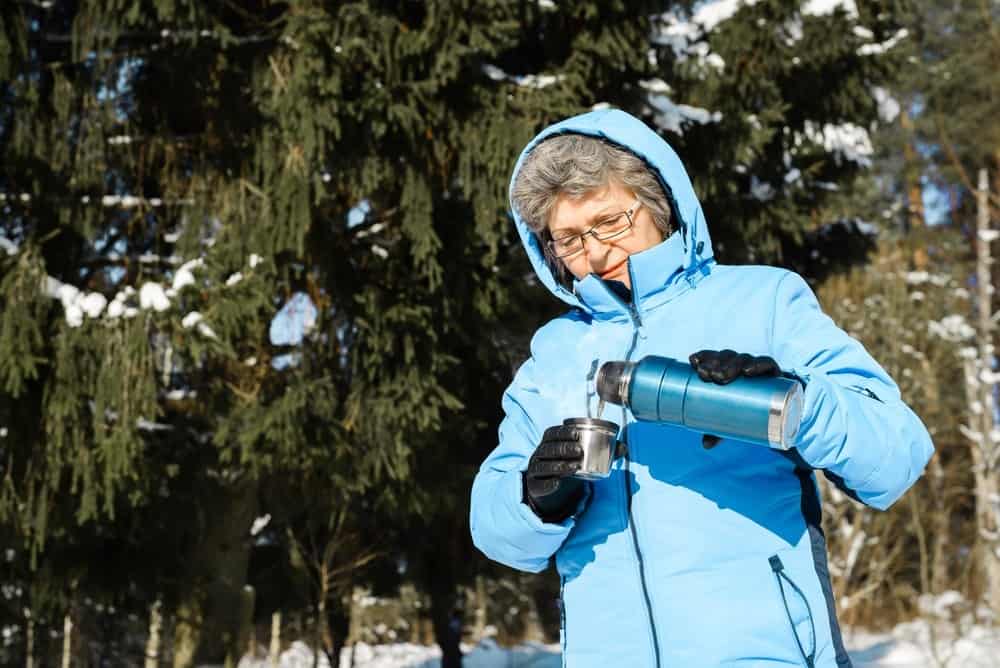You might not even realize it, but you might be dehydrated right now. Dehydration is a really sneaky thing, especially in older adults. As we age, our sense of thirst diminishes. On top of that, older bodies simply don’t retain as much water as they once did. When you combine those two facts about what aging does to the human body, it’s easy to see why dehydration is actually a common though often overlooked health risk for seniors. And dehydration can lead to urinary tract infections, falls and kidney stones, any of which may require hospitalization. Which leads us to our big concern as we enter the colder months: winter dehydration. Yes, in case you’re wondering, you can get dehydrated in the winter. Actually, the risk of dehydration in seniors during the winter months is greater than during the summer months.
Why you can get dehydrated in the winter
Regardless of the temperature outside, our bodies lose moisture all day, every day, through respiration, perspiration, urination and other bodily functions. But especially when it’s cold out, the body loses more fluids through respiratory water loss than on warm days. Go outside when it’s very cold, and just breathe in and out. See that big plume coming out of your mouth? That’s water vapor your body is losing. The colder the temps and the more heavily you’re breathing, the more water you’re losing in the form of water vapor. And that’s not the only way you can become dehydrated in the winter. Heavy clothing, like down jackets, long underwear, wool sweaters and flannel shirts, help your body conserve heat. But the added weight makes your body work harder and produce more sweat, contributing to fluid loss. Sweat evaporates more quickly in the cold, dry air, and that can easily result in winter dehydration. Without the sweat, we aren’t reminded that we’re losing fluids as we are when we sweat on a hot summer day. Colder temps also reduce the body’s thirst response, which means if you’re exercising in cold weather, you may be much less likely to drink fluids voluntarily. You may have heard it said that by the time you feel you’re thirsty, you’re already dehydrated. But because that response may be suppressed in winter, older adults especially need to be aware of these symptoms of dehydration:
- Dry, sticky “cotton” mouth
- Sleepiness
- Fatigue
- Dry skin
- Headache
- Constipation
- Dizziness
- Generally not feeling well
Severe dehydration is a medical emergency and can cause irritability and confusion in adults. It may also result in little or no urination — and any urine that is produced will be darker than normal.
Avoid dehydration in the winter with these tips
In addition to our bodies not feeling as thirsty as we get older, prescription medicines can dehydrate seniors, or can make them urinate excessively. It’s easy to say that preventing hydration simply requires that we drink more fluids. And while that’s true, it’s often not so easy to do. But here are six great tips to avoid becoming dehydrated in the winter:
- One helpful tip is to drink fluids regularly throughout the day. Keep a portable water bottle on hand that’s marked to show the levels of water you’re drinking. Doctors recommend older adults drink at least 60 ounces of water every day — a gallon of water is 128 fluid ounces, so aim for about a half-gallon a day. And that’s the minimum!
- If that sounds like too much water, integrate fruits and vegetables into your diet that have a high water content, like melons, cucumbers, lettuce, oranges, tomatoes, celery and spinach. Other foods to try include peaches, pineapple and strawberries — and as a bonus, these are all foods that are healthier for you, so it’s a win-win!
- Soups and stews are also great options to add to your menu. Or eat cottage cheese, since it’s 80% water.
- Add water flavorings to your water, or cut up lemon slices to flavor your water naturally.
- Despite what you’ve heard, coffee and tea actually don’t dehydrate you. So go ahead and enjoy a cup or two of coffee, or a hot or iced tea. You can also whip up some hot chocolate with 2% milk, which will warm you inside and hydrate you at the same time.
- However, alcohol WILL dehydrate you. Alcohol can decrease the production of the antidiuretic hormone that helps the body reabsorb water. This increases urination, causes the body to lose more fluid than normal and creates symptoms such as dry mouth, thirst and headaches. If you’re drinking alcohol, drink a glass of water or a drink high in electrolytes with every alcoholic drink.
Can swimming help keep you hydrated?
No, it can’t. Just jumping in a warm indoor pool or spa won’t help you rehydrate. But what it will do is make you feel more relaxed and rejuvenated. As it happens, Ventana by Buckner, Dallas’ choice for luxury high-rise senior living, has an indoor pool. And a casual café/bistro and coffee and juice bar where you can pick up all kinds of hot and cold drinks. Not to mention five unique food and beverage venues exclusive to Ventana. And this is just a slice of all our senior living community has to offer you. To learn about our engaging, luxurious way of life, just contact us.

